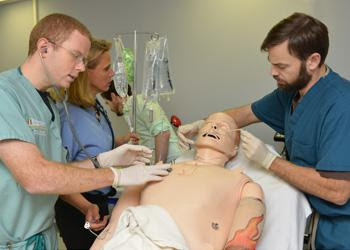Mannequin-based simulations are imitation or faker models that are utilized as virtual patients in the emergency clinic and clinical instruction. Mannequin-based gadgets are preparing gadgets that emulate reality in medical services settings to obtain essential procedural abilities, without compromising patient security. Mannequin-based simulations or test systems are utilized to learn and encounter in multidisciplinary regions. Reproduction based instructive intercessions in nursing can prepare amateur just as experienced medical caretakers, assisting them with creating successful non-specialized abilities, practice uncommon crisis circumstances, and giving an assortment of bona fide perilous circumstances. Mannequin-based simulations utilize high devotion test systems, mannequins that inhale, with breath sounds, heart tones, and discernible heartbeats.
These life-like mannequins simulate heart tones and other vital cues that when connected to monitors, provides real-time information to students. Mannequin-based simulation is refers to a computer generated image of the human body in various stages from head to feet by replacing with actual mannequins, 3D drawings, and realistic animations. Mannequin-based simulators offers various solutions to medical and health studies. By replacing mannequins with actual medical equipment, patients can respond to medical questions at any stage of study. Some of these human responses can be shown through mannequin-based simulation. This simulates real life situations and conditions and helps researchers conduct more scientific experiments.
Mannequin-based simulations offer a great help to nursing students. Nurses often face tough challenges when presented with medical situations that require them to evaluate their own performance and ability to provide medical attention. One of the most common reasons why nurses give less than optimal service is because they do not feel comfortable and confident in their capacity to handle difficult situations. Medical education based on mannequin-based simulation can help solve this problem and improve nurses' self-confidence. Simulators have been used extensively in medical and engineering fields to study possible adverse effects of new technologies on human health and wellbeing.
For example, simulators have been used to study the negative effects of radiation exposure on humans. The results of these studies have been very helpful for researchers who are working to develop new medical treatments and devices for the future. Mannequin-based assessment measures can also be used to improve the performance of the students. A large proportion of classrooms worldwide are lacking suitable assessment measures. Some teachers and educators actually measure student's behavior outside the classroom. This is a very ineffective practice since a large majority of students are naturally shy and do not wish to speak to a teacher directly. Moreover, such direct interaction with the teacher can only provide partial information about how the student behaves in certain situations.
In order to facilitate effective training programs, teachers should include realistic exercises that allow trainees to experience real scenarios in an actual learning environment. For example, in a medical training program, trainees should be able to participate in a simulated heart attack, and then simulate various laboratory procedures while discussing various symptoms with the instructor. Based on the instructor's discussion, the participant can then simulate performing the various tasks under real conditions using a medical simulator. The end result of this exercise is that the simulator plays a crucial role in helping learners to realize their performance in an actual clinical situation.




No comments:
Post a Comment